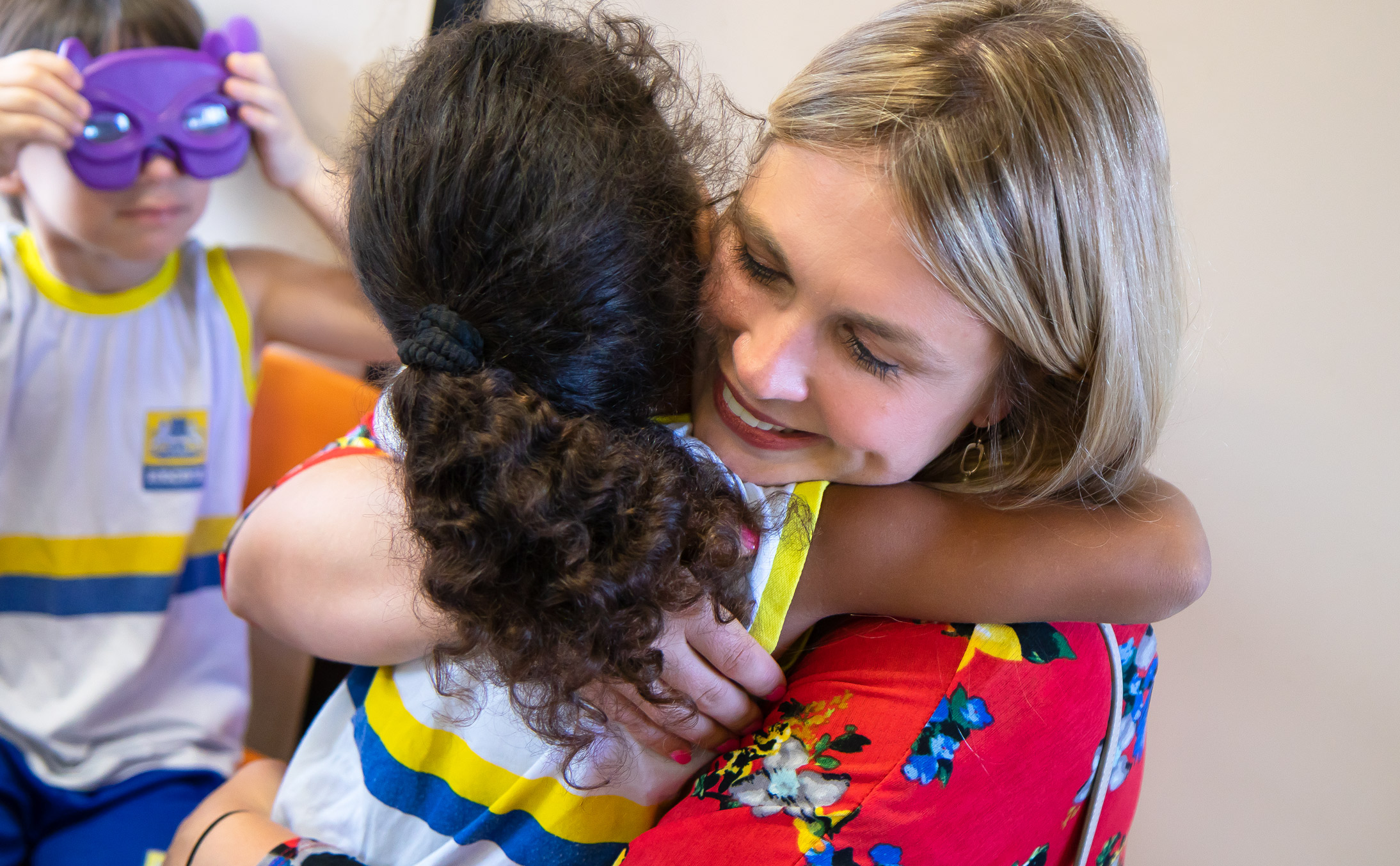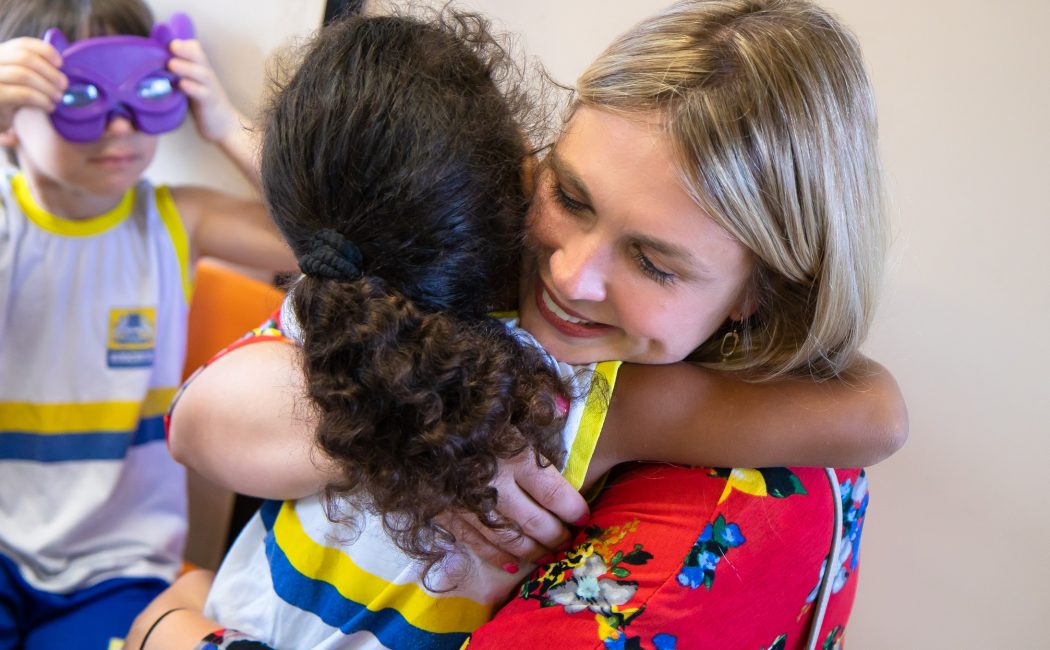
While great efforts are made to improve children’s well-being in childcare environments, far less attention is paid to caregivers’ well-being. Evidence shows compassion- and mindfulness-based programs and strategies enhance both caregiver and child well-being, which may reduce burnout, stress and depression — and lead to children receiving more sensitive and responsive care.
Holly Hatton-Bowers, assistant professor of child, youth and family studies, is collaborating internationally with researchers to adapt compassion- and mindfulness-based programs developed in the U.S. to support caregivers, young children and college students in Recife, Brazil. The team aims to cultivate resilience, compassion and kindness among caregivers to improve well-being and increase capacity to deliver high-quality care to young children by adapting Nebraska Extension’s Cultivating Healthy Intentional Mindful Educators (CHIME) program.
CHIME is an eight-week professional development program that provides education and guidance for practicing mindfulness and compassion-based strategies. It also provides time for caregivers to engage in reflective practice and use mindfulness with young children.
Engaging in mindfulness and reflective practice benefits health and well-being of both providers and young children — including reduced stress, improved emotion regulation, better sleep quality, increased focus and attention, and enhanced relationships.
Through the Nebraska-Brazil Early Childhood Partnership, Hatton-Bowers has established relationships with several Brazilian colleagues interested in using compassion- and mindfulness-based strategies in education and medical settings.
Researchers aim to identify whether CHIME’s strategies are acceptable to early childhood caregivers and primary school teachers in Recife, an area with children and families dramatically impacted by the country’s 2015-16 Zika outbreak. They also hope to eventually create and evaluate mindfulness program for college students attending the Universidade Federal Rural De Pernambuco who plan to work in education.
Since 2017, 233 Nebraska educators have completed CHIME. Most participants report decreases in stress and burnout, emotion dysregulation and increases in perceived general health, quality of sleep, caregiving efficacy and having control at work. They also report being more mindful, aware and observant in general.
Hatton-Bowers’ collaborators at Universidade Federal Rural de Pernambuco include Pompéia Villachan-Lyra, and graduate student Ana Maria da Fonte Alves, who is also working on the project as a trained facilitator and helped translate the CHIME program into Portuguese.
“I am excited to adapt CHIME to the Brazilian reality and guide teachers to use mindfulness and compassion in their daily lives,” da Fonte Alves said. “I believe that having educators learn about mindfulness provides powerful and effective strategies for teachers — especially those who work with early childhood education.”
In a recent survey of 237 early childhood teachers working in Recife, Brazil, as part of da Fonte Alves’ thesis, 19% of the teachers agreed that their emotional health was poor or very poor and 51% reported they were not dealing with their stressors well.
During early childhood, children are rapidly developing important social-emotional skills, and they need caring, attuned adults to help them understand adaptive, healthy ways to regulate emotions.”
— Holly Hatton-Bowers, assistant professor, CYAF
Hatton-Bowers plans to begin the CHIME professional development pilot in Brazil this fall after 55 early childhood teachers and caregivers expressed interest in participating in the all-virtual training program. Initially, da Fonte Alves will deliver CHIME to small groups of teachers.
“Some facilitators say it’s more effective virtually,” Hatton-Bowers said. “They report that participants feel comfortable expressing their thoughts and feelings in a virtual space, and there is a high level of engagement.”
As a former early childhood educator, Hatton-Bowers has long been aware of the importance of teachers leading by example.
“During early childhood, children are rapidly developing important social-emotional skills, and they need caring, attuned adults to help them understand adaptive, healthy ways to regulate emotions,” she said. “The intention of CHIME is to support directors and early childhood educators to use mindfulness- and compassion-based strategies to be more emotionally regulated.”
Hatton-Bowers emphasizes that CHIME is not just focused on stress reduction. Its broader scope focuses on enhancing relationships in a more responsive and healthy way.
“People in the early childhood education system are essential workers, and there are systemic issues that need to be addressed for early childhood educators to feel supported and valued in their roles,” she said. “Though CHIME does not address many of these systemic barriers and inequities, it is one way to elevate the importance of educator well-being and encouraging leadership to provide their staff with the support, time, and space to focus on educator’s emotional well-being.”
Learn more about CHIME in the CYFS Research Network.
